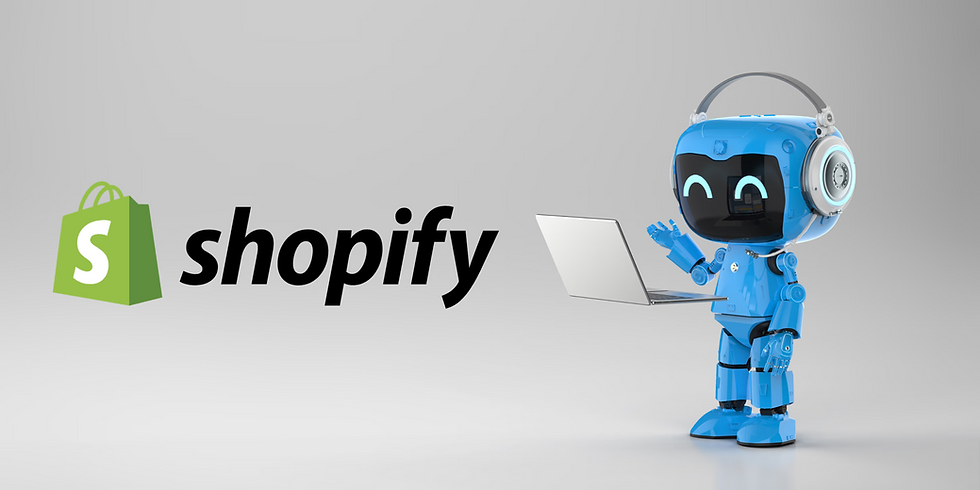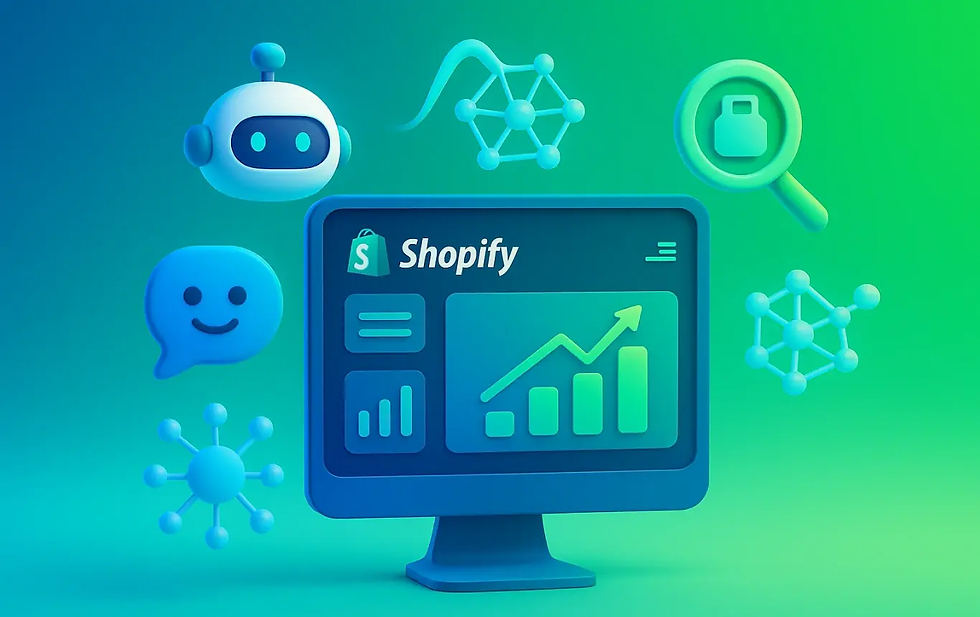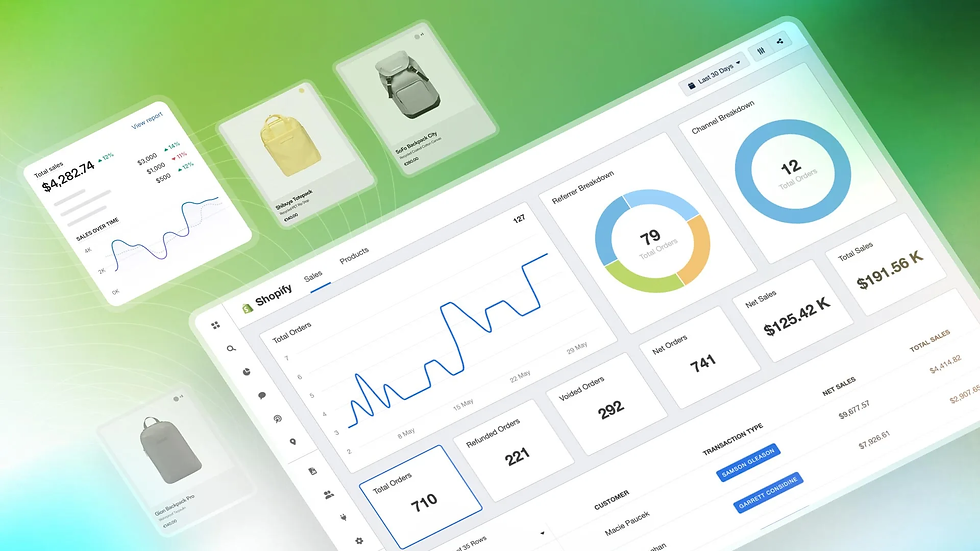Shopify CEO Declares AI a Must for All Staff in 2025
- Ethan Carter

- Aug 19, 2025
- 11 min read

In a landmark announcement, Shopify’s CEO has declared that artificial intelligence (AI) will become mandatory for all employees by 2025. This bold move signals a transformative shift not only within Shopify but across the e-commerce industry at large. By making AI an essential tool for every staff member, Shopify aims to accelerate operational efficiency, enhance merchant experiences, and maintain its competitive edge in a rapidly evolving market.
The declaration came in early 2025, with an official rollout timeline spanning the entire year. Employees are expected to integrate AI-powered tools into their daily workflows, supported by formal training and compliance frameworks. This mandate underscores the growing recognition that AI is no longer optional but a foundational element of modern business. For merchants, this means faster innovation cycles and more intelligent platform features, while employees face new expectations for AI fluency and ethical usage.
What the Shopify CEO Declares: Core Mandate and Scope
At its core, the Shopify AI mandate for 2025 establishes that AI-powered tools will be a mandatory resource for all employees across departments. The CEO emphasized that staff must not only adopt AI technologies but also integrate them into everyday problem-solving, decision-making, and productivity workflows. This mandate spans a broad spectrum of tools including large language models (LLMs), automation agents, and data analytics platforms designed to augment human capabilities.
Shopify’s official communication outlines clear expectations: employees are required to utilize designated AI tools for tasks where they can add measurable value, from content creation and customer support to engineering and finance operations. Beyond usage, the company mandates adherence to specific guidelines governing ethical AI use, data privacy protections, and transparent reporting of AI interactions.
This policy also sets behavioral standards: staff must demonstrate not only proficiency but also responsibility in managing AI outputs—ensuring human oversight remains central to critical decisions. Training programs and compliance checks will support employees in meeting these standards while fostering a culture that embraces AI as a collaborative partner rather than a mere utility.
Why the Shopify AI Mandate 2025 Is Relevant Now
Shopify’s announcement arrives amid an unprecedented acceleration of AI adoption across the e-commerce sector. As competitors integrate more intelligent features and consumers demand personalized experiences, adopting AI has shifted from an experimental advantage to a business imperative. Shopify’s mandate serves as a bellwether signaling that successful e-commerce platforms must embed AI deeply within their operational DNA.
This shift reflects broader trends such as rising merchant expectations for data-driven insights, automation in customer interactions, and agile product development powered by AI. The mandate also anticipates regulatory scrutiny by establishing governance frameworks upfront.
In the sections ahead, we will explore how Shopify is implementing this policy technically and operationally, analyze its market impact, and examine how employees are adapting to this new reality. The journey from strategy to execution offers valuable lessons for merchants, competitors, and industry watchers alike.
History and Strategic Context for the Shopify AI Mandate 2025

Shopify’s 2025 AI mandate builds on years of strategic investments in artificial intelligence designed to enhance merchant success and platform efficiency. Starting with early integrations like automated product recommendations and dynamic pricing tools, Shopify has steadily woven AI into its core offerings.
Analysts note that this gradual integration was deliberate: by incrementally introducing AI-powered features such as chatbots and inventory forecasting tools, Shopify laid the groundwork for company-wide adoption without disruption. These initiatives improved merchant acquisition rates by offering smarter sales funnels and more personalized storefronts.
The strategic rationale behind the mandate is clear: harnessing AI at scale promises significant efficiency gains internally while delivering differentiated value for merchants. In an increasingly crowded e-commerce landscape, this positions Shopify ahead of rivals who remain cautious about full-scale AI adoption.
2022: Launch of Shopify’s AI-powered product description generator.
2023: Introduction of customer support chatbots integrated with LLMs.
Early 2024: Beta release of internal productivity assistants using automation agents.
Q1 2025: Formal announcement of the company-wide AI mandate.
These advances culminated in the CEO’s declaration that all staff must fully adopt AI by year-end 2025 to maintain competitive positioning.
Timeline of Shopify’s AI Rollouts Prior to the 2025 Mandate
Shopify’s approach to AI has been characterized by steady integration rather than sudden pivots:
Mid-2021: Experimentation with machine learning for fraud detection.
Late 2022: Merchant-facing rollout of AI-generated marketing copy tools.
2023: Expansion of LLM-based chatbots for customer service.
Early 2024: Internal deployment of automation agents across finance and legal teams.
Q1 2025: Announcement of mandatory AI use for all staff by end of year.
This timeline shows a deliberate strategy combining R&D milestones with expanding practical applications that build employee familiarity ahead of the full mandate.
Market Forces That Pushed Shopify Toward an AI-First Policy
Several market dynamics compelled Shopify to formalize its AI-first policy:
Increasing competition from platforms offering advanced personalization powered by AI.
Merchant demands for faster insights and automation to compete in a crowded marketplace.
Data showing higher retention rates among merchants using AI features.
Analyst consensus that AI adoption is a critical driver of future revenue growth.
One notable statistic cited by analysts is that merchants leveraging Shopify’s early AI tools saw a 15% increase in conversion rates compared to those who did not — a powerful incentive for deeper integration.
Shopify’s move is framed less as a chase after trends and more as a necessary evolution to sustain relevance amid shifting market expectations.
What the Shopify AI Mandate 2025 Requires of Staff and Policy Mechanics

The mandate compels all Shopify employees to incorporate designated AI tools into their workflows daily. It specifies several key areas:
Mandatory Usage: Employees must use approved AI platforms when performing tasks where these tools can provide efficiency or insight gains.
Compliance Checks: Regular reporting on AI tool usage is required through automated logs and manager sign-offs.
Governance: Centralized oversight ensures ethical standards are met while allowing business units some autonomy in tool customization.
Ethical Use: Employees must protect personally identifiable information (PII), ensure transparency in AI outputs, and maintain human oversight.
Hiring & Performance: Familiarity with AI tools factors into hiring criteria and performance evaluations going forward.
Together, these elements make clear that Shopify views AI literacy as essential for future success—not just optional skill development.
Mandatory Usage, Compliance Checks, and Reporting Structures
Compliance with the mandate involves:
Usage Tracking: Automated logs track when and how employees engage with designated AI tools.
Manager Sign-offs: Supervisors review monthly reports confirming appropriate tool use aligned with job functions.
Repercussions: Non-compliance can lead to retraining or disciplinary actions aimed at ensuring policy adherence.
Governance Model: A centralized AI governance team provides guidelines and monitors risk but grants departments flexibility in selecting specific tools within approved frameworks.
This structured oversight balances enforcement with adaptability to diverse roles across Shopify's global workforce.
Compliance Checklist:
Use approved AI tools consistently in daily tasks.
Report usage metrics accurately via internal dashboards.
Follow ethical guidelines on data privacy.
Participate in periodic training refreshers.
More details are available from Forbes’ report on how Shopify sells its AI vision internally.
AI Ethics, Data Privacy, and Internal Safeguards under the Shopify AI Mandate 2025
Shopify’s policy places strong emphasis on ethical AI use. Key safeguards include:
Strict controls on handling personally identifiable information (PII) within all AI interactions.
Requirements for documenting model provenance—ensuring transparency about which algorithms generate outputs.
Mandatory human oversight protocols for decisions affecting merchants or customers critically.
Alignment with emerging external regulations on data privacy and algorithmic accountability.
By integrating these guardrails into daily operations, Shopify aims to preempt potential risks such as bias or data leaks while maintaining trust across its ecosystem.
Tools, AI Agents, and Engineering Approaches Behind the Shopify AI Mandate 2025

To achieve company-wide adoption of AI, Shopify is deploying an ecosystem of sophisticated AI tools ranging from LLM-based assistants to automation engines designed for workflow augmentation. This requires significant engineering effort across platform architecture, integration layers, and monitoring systems.
Key challenges include ensuring low-latency responses for real-time tasks, managing model drift through continuous evaluation, and providing secure access control aligned with corporate policies. The technical team has developed modular agent frameworks enabling flexible deployment while maintaining centralized governance over data handling.
These efforts reflect a commitment not just to adopt off-the-shelf solutions but to build scalable infrastructure supporting ongoing innovation under the mandate.
For an overview of these rules governing agent deployment, see PYMNTS’ report on Shopify’s new rules and insights from Ecommerce North America on engineering challenges.
Core AI Tools and Agent Types Expected Under the Mandate
The suite of tools mandated includes:
LLM-based Assistants: For generating content such as marketing copy or customer responses.
Retrieval-Augmented Generation (RAG) Systems: Combining external knowledge bases with generative models to provide accurate information.
Automation Agents: Handling routine tasks like scheduling, billing reconciliation, or error detection.
Shopify employs a hybrid approach mixing proprietary models with vetted third-party providers to optimize performance and control costs. These tools are embedded in everyday applications ranging from email drafting interfaces to complex analytics dashboards.
This diversified toolkit ensures wide applicability across roles while aligning with governance standards set forth by leadership.
Operationalizing AI at Scale: Monitoring, Security, and Developer Enablement
To maintain safe operation at scale, Shopify implements:
Model Monitoring: Continuous evaluation pipelines detect model drift or anomalies affecting output quality.
Security Controls: Role-based access limits who can deploy or modify models; data pipelines are encrypted end-to-end.
Developer Portals: Internal platforms provide APIs, documentation, and sandbox environments fostering safe experimentation.
Versioning & Rollbacks: Automated tracking of model versions enables rapid rollback if issues arise post-deployment.
These practices align with best-in-class AI governance principles ensuring both agility in innovation and mitigation of operational risks.
For deeper insight into these processes, see Ecommerce North America’s coverage on Shopify’s engineering approach.
How the Shopify AI Mandate 2025 Affects E-Commerce Outcomes and Market Position

Analysts widely agree that Shopify’s mandatory AI adoption positions it strongly in a competitive marketplace increasingly driven by intelligent commerce solutions. Early data indicates positive short-term impacts on revenue growth and merchant engagement—key indicators of product-market fit in evolving digital retail environments.
According to Forrester’s recent report on Shopify’s AI adoption, merchants leveraging new platform capabilities show higher retention rates and increased average order values. Gartner’s analysis further highlights how this strategic pivot strengthens Shopify’s differentiation against competitors slow to embrace enterprise-wide AI.
Moreover, recent quarterly earnings revealed by Reuters confirm that Shopify beat holiday quarter revenue estimates thanks in part to increased consumer spending facilitated by smarter merchant tools.
Short-Term KPIs: Merchant Adoption, Engagement, and Revenue Signals
In the first 3–12 months post-mandate rollout, key performance indicators include:
Merchant Adoption Rate: Percentage of merchants actively using new AI-enabled features.
Customer Engagement Metrics: Click-through rates on personalized recommendations driven by AI.
Revenue Uplift: Gross merchandise volume (GMV) increases attributable to automation-driven efficiencies.
For example:
Merchants employing automated product description generators reported up to a 10% reduction in time-to-market for new listings while boosting conversion rates by approximately 8%.
Tracking these metrics helps assess whether the mandate translates into tangible business outcomes early in implementation.
Industry Forecasts and Competitive Landscape After the Shopify AI Mandate 2025
Forecasts suggest sustained growth for Shopify fueled by deeper merchant integration and enhanced platform capabilities:
Scenario | Description | Implications |
|---|---|---|
Optimistic | Rapid merchant adoption leads to double-digit GMV growth | Market leadership solidified; competitor gap widens |
Base Case | Steady adoption drives moderate revenue gains | Competitive parity maintained; incremental innovation |
Risk Scenario | Rapid commoditization of AI reduces differentiation | Margin pressures increase; need for new innovation |
Risks include potential overreliance on commoditized third-party models eroding unique advantages or regulatory hurdles impacting deployment speed. However, most analysts agree that early comprehensive adoption offers Shopify critical runway ahead.
Employee Impact, Training, and Organizational Change under the Shopify AI Mandate 2025

The mandate reshapes job roles across technical and non-technical domains. While some employees welcome productivity gains from automation agents and intelligent assistants, others express concerns about job security and rapid change. Effective training programs combined with transparent communication form pillars supporting smooth transition toward an AI-first culture.
Shopify invests heavily in reskilling initiatives emphasizing augmentation rather than replacement—helping staff evolve their skills alongside emerging technologies rather than being displaced by them.
For detailed analysis of workforce implications and change management strategies, see The New York Times’ examination alongside Forbes’ insights into employee anxieties around hiring policies.
Training, Reskilling, and Change Management for the Shopify AI Mandate 2025
Shopify implements role-based curricula featuring:
Hands-on labs simulating real-world use cases.
Manager coaching sessions focused on embedding best practices.
Performance benchmarks tracking proficiency milestones.
Training effectiveness is measured through ongoing assessments coupled with employee feedback loops ensuring iterative improvement.
A typical training pathway includes initial orientation followed by monthly workshops targeting specific toolsets relevant to each department’s workflows.
Addressing Job Security Fears and Building AI-Augmented Teams
To address employee concerns about displacement:
Leadership prioritizes transparent communication regarding workforce strategy.
Voluntary redeployment programs help transition affected workers into emerging roles.
Clear career ladders demonstrate how skills augmented by AI open new advancement paths.
Policies proven effective include flexible work assignments blending human judgment with machine capabilities—mitigating morale loss while maximizing productivity gains.
Real-world Examples of Shopify AI Mandate 2025 in Action

Early deployments illustrate how integrating AI transforms merchant offerings and internal efficiency alike:
Merchant-Facing Use Cases Under the Shopify AI Mandate 2025
Examples include:
Automated generation of product descriptions tailored to specific audiences.
Personalized storefronts dynamically adapting promotions based on customer behavior.
Chatbots providing instant customer support reducing response times significantly.
Dynamic pricing experiments optimizing margins using real-time market data.
One merchant reported a 12% uplift in sales conversion after adopting automated content generation integrated through Shopify’s platform.
Internal Productivity and Agent Use Cases Inside Shopify
Internal teams leverage:
Legal assistants automating contract review drafts saving hours weekly.
Finance bots reconciling invoices reducing errors by over 20%.
Engineering support agents triaging code issues accelerating bug resolution cycles.
Pilot programs demonstrated up to 30% time savings in routine tasks with improved accuracy thanks to human-in-the-loop reviews ensuring quality control.
Governance frameworks evolved during pilots—from centralized approvals toward hybrid models empowering teams while maintaining ethical standards.
FAQ — Likely Reader Questions About the Shopify AI Mandate 2025
Q1: When does the Shopify CEO’s AI mandate take effect?
Q2: Which employees must use AI under this policy?
All full-time staff across departments are required to incorporate approved AI tools into their workflows where relevant.
Q3: What happens if employees don’t comply?
Non-compliance triggers retraining efforts followed by possible disciplinary measures if issues persist; managers oversee adherence closely.
Q4: How does Shopify handle data privacy under this mandate?
Strict protocols govern PII protection within all uses of AI; transparency about model provenance is required along with human oversight.
Q5: Will employees lose jobs due to increased automation?
Shopify emphasizes augmentation over replacement; reskilling programs aim to transition workers into enhanced roles rather than layoffs.
Q6: What types of tools are mandated?
Tools include LLM-based assistants for content generation, retrieval augmented generation systems for knowledge tasks, plus automation agents handling repetitive processes .
Q7: How will merchant experience improve?
Merchants benefit from personalized storefronts, automated product descriptions, dynamic pricing models—all designed to enhance conversion rates.
Q8: What training does Shopify provide?
Role-based curricula featuring hands-on labs, manager coaching sessions, and performance benchmarks ensure effective skill development.
Conclusion & Forward Outlook — Trends & Opportunities

Shopify’s CEO declaration making AI mandatory for all staff in 2025 marks a pivotal moment for e-commerce innovation. For employees, embracing this shift means acquiring new skills grounded in responsible technology use supported by robust training pathways. Merchants stand to gain from smarter platform features driving growth through personalization and automation. Competitors must heed this signal or risk losing ground as intelligent commerce becomes table stakes.
Looking forward through 2026–2028 three scenarios emerge:
Optimistic: Wide adoption leads to significant operational efficiencies and merchant success stories cementing Shopify's market leadership.
Base Case: Steady progress yields incremental improvements but competitive pressure intensifies requiring continued innovation investments.
Risk Scenario: Complacency or regulatory hurdles slow momentum; commoditized solutions erode differentiation forcing strategic pivots.
Key metrics such as merchant adoption rates, GMV uplift linked directly to AI features, employee proficiency milestones, and compliance adherence should be monitored closely as early indicators of long-term success.
Actionable takeaways:
Employees should proactively engage with training programs to develop confidence deploying mandated tools responsibly.
Merchants can explore integrating new personalized features early to maximize competitive advantage.
Industry observers should watch how governance models evolve balancing innovation speed with ethical safeguards.
Shopify’s move is more than policy—it is a blueprint charting how e-commerce companies can harness artificial intelligence responsibly at scale for sustainable growth.


